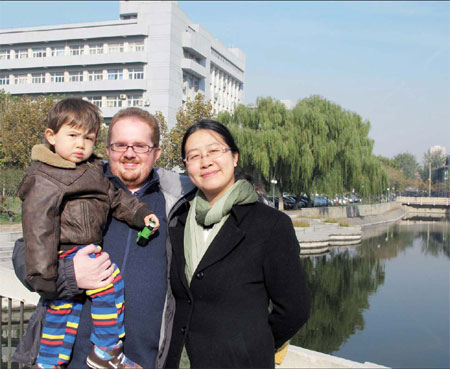Good life scientist

| Mark Bartlam with his family at Nankai University. Yang Yang / China Daily |
UK biophysicist says Chinese research in war against disease Looks good under the microscope
In his 13 years in China, British biophysicist Mark Bartlam has played a significant part in the robust development of the country's life sciences.
His contribution was recognized last year with a Friendship Award of China from the government.
The Friendship Award is given by the Chinese government as the highest honor to foreign experts for their contribution to China's social and economic development.
Bartlam, professor of structural biology at Nankai University in Tianjin, says research in life sciences is well funded because the government is determined to develop the biotechnology and pharmaceutical industry.
The progress being made and support given is attracting more overseas researchers, particularly returned Chinese researchers.
"It will help improve the research level. It also means that students can have better teachers," says Bartlam at his office in the university's New Life Sciences Building in downtown Tianjian.
Bartlam, 38, is currently teaching a course on virus and tumor-related protein function and structure, and is also leading research into proteins that can be used to develop drugs to fight diseases, including SARS, cancer and influenza, at the State Key Laboratory of Medicinal Chemical Biology.
Research papers have become a vitally important measure for how universities and research institutes in China evaluate the work of academic staff and students.
China is now second to the US in the number of published research papers on life sciences, but the quality of Chinese research has always been subject to criticism.
"The quality is improving and in a few years it will reach the level of the US," Bartlam says.
"The government is very keen to promote biotechnology and the pharmaceutical industry. They want to have a high level of research talent, so they invest a lot in grants, and building high-standard research labs, which are equivalent to or even better than the labs in UK or the US.
"Because of the changes and development of life sciences in the past several years, more research people have come back to China, and the number of labs has increased. These people can bring in more research money, and by forming research teams, we can get more funding together to improve research levels."
Bartlam grew up in a village near Birmingham and developed a talent for science and mathematics. When he was 11, his headmaster asked him to do an IQ test. With a rating of 150, it was suggested he become a nuclear physicist.
Today's Top News
- Xi stresses improving long-term mechanisms for cyberspace governance
- Experts share ideas on advancing human rights
- Japan PM's remarks on Taiwan send severely wrong signal
- Key steps to boost RMB's intl standing highlighted
- Sustained fight against corruption urged
- Xi calls for promotion of spirit of volunteerism































